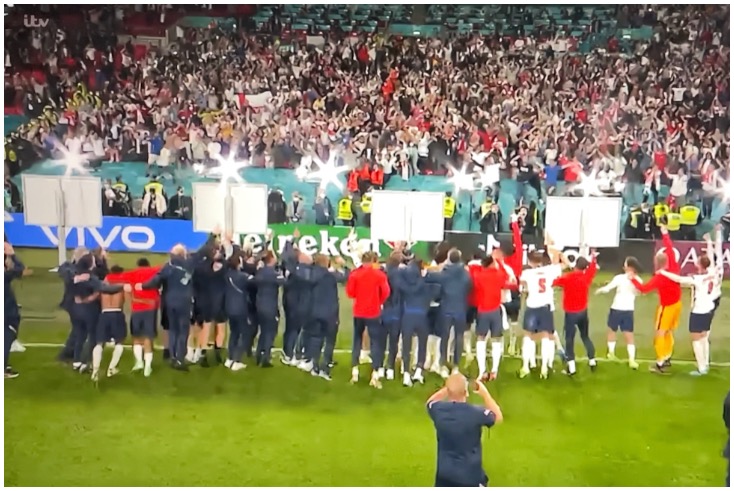The Week in Media: rumblings of change amid Euro 2020 cheers

Could things have gone any better for ITV this week?
On Monday, Prime Minister (and man who wears football jerseys over a formal shirt and tie), Boris Johnson, confirmed that legal restrictions on human behaviour will end on 19 July. As Covid-19 vaccinations seem to protect the vast majority of vulnerable people from the Delta variant, it’s a clear signal from government that now is the time to return to normal.
Whatever your views on whether the Government is too hasty in allowing nightclubs and mass gatherings to return, business confidence is likely to rise to ever higher levels, with the travel and hospitality sectors turning the spend tap back on. This is good news for the whole advertising sector.
Then, ITV announced its first foray into “shoppable TV”, a new option available on newer LG TVs where viewers can shop for Boots products featured in Love Island – its raunchy game show that remains wildly popular with those ever hard-to-reach young people.
Sky Media, in its first upfronts in April, announced that it too would pilot a “shoppable ads” format in which viewers can use time-limited QR codes shown on screen to take advantage of offers.
Neither of these formats appeals to me – shopping feels like work to me and I just want it to be over as soon as possible – but, as smart media planners will often remind us: people who work in media are the last people on earth to model consumers on. Apart from people who wear football jerseys over their shirts, perhaps.
You only need to look at the popularity of social commerce in China, where sales surpassed £131bn in 2019, before the pandemic, or the way Facebook has effectively turned Instagram into an online shopping centre.
There is a growing demand for content-driven shopping as people spend more of their lives online and, regardless of how much ad revenue ITV is making from Love Island, it makes sense to begin building an e-commerce business off its hottest property with younger audiences.
Then brought Wednesday’s historic night of sport, in which ITV exclusively broadcast England’s victory over Denmark at Euro 2020.
As Ray Snoddy pointed out ahead of the game, this match was effectively the final for ITV because most people tend to watch the actual final on BBC when major football matches are simulcast.
With an astronomical peak of 26 million people watching on Wednesday night (plus millions more via video-on-demand), live sport reminds us that TV remains unassailable as the place for brands to reach mass audiences with their most effective creative advertising.
This is why sponsorship of events like Euro 2020 are so important to advertisers such as Heineken, Booking.com and Coca-Cola.
It’s perhaps even more important for the tournament’s newest sponsor TikTok, whose idents have been all over ITV’s coverage and the pitch-side hoardings during matches.
A source familiar with TikTok’s media strategy told me recently that “going vertical” is very much part of the Chinese entertainment app’s medium-term strategy, which is why it got Ed Sheeran to host a TikTok Uefa Euro 2020 show last month.
This is the challenge that traditional broadcasters now face. Live sport remains the most valuable asset for pulling in mass audiences, but there are growing supply and demand forces that are threatening this mediated relationship between sport and fans.
TikTok and YouTube, which are built on user-generated content, are in a prime position to enable fans to communicate with football stars and clubs in ever more creative ways. Yes, there are serious brand safety issues, but these platforms have unlocked an avalanche of creativity from people outside of the media mainstream. Football broadcasting, for the most part, is pretty much the same as it was 25 years ago – the last time England reached a Euros semi-final.
Whether it’s consuming sport content or live shopping (or some combination of both), TV broadcasters will need to continue innovating as consumers expect more interactive and personalised experiences on media generally.
Yes, this week was a timely reminder of the power of TV to bring a country together, whether it’s because a football team succeeds or a Prime Minister makes a major announcement. But, unless there’s another once-in-a-lifetime event around the corner, the hard work of innovation must continue.




